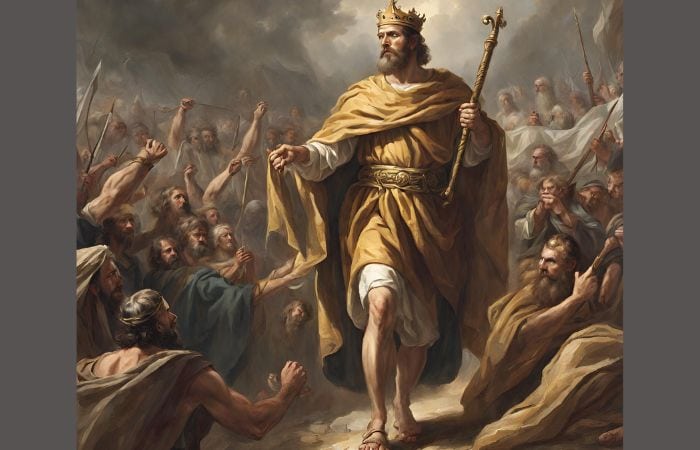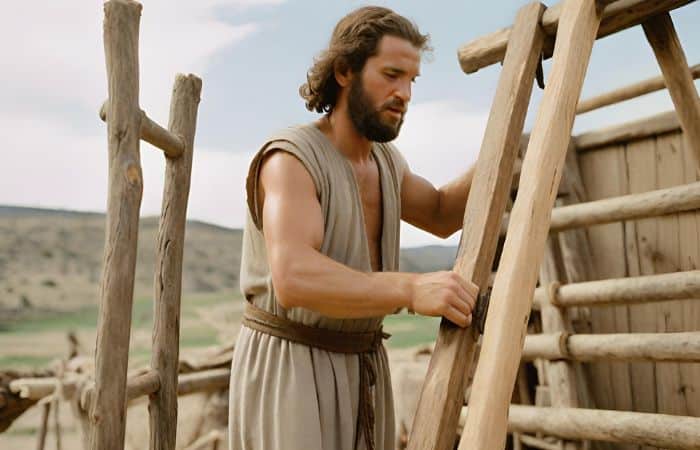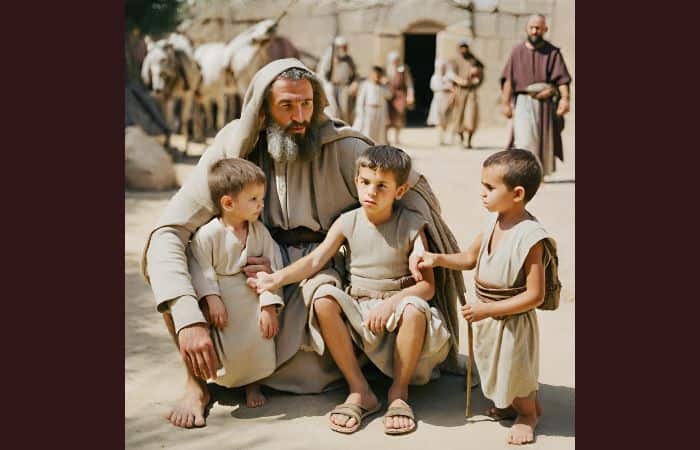Introduction
When we talk about dads and their role in our lives, it’s a mix of the good, the bad, and everything in between. Whether it’s changing diapers at 2 AM, teaching you how to ride a bike, or just being there when things get tough, fathers have a big part to play.
But what does it mean to be a good dad, especially when we look at it from the Bible’s point of view? Let’s break it down, not with the heaviest theology, but by looking at some examples of good and bad fathers in the Bible.
The Bible is not shy about laying out what makes a good dad and what doesn’t. From Adam, the first man and dad, to Joseph, who raised Jesus, there are plenty of stories that show us the dos and don’ts of fatherhood. These stories aren’t just ancient texts; they’re like guideposts for modern fathers trying to navigate the parenting highway today.
Bad fathers? Yeah, the Bible has them too. They’re the ones who missed the mark, sometimes big time. But even those stories are there for a reason – they teach us what not to do and remind us that nobody’s perfect. Whether it’s not being there for the kids, leading them down the wrong path, or just plain old making bad choices, the Bible doesn’t hide the flaws.
A Perfect Father
Before we really get going, let’s first remind ourselves that there is an ultimate father figure, a perfect Father– God, the Heavenly Father. His way of parenting sets the bar incredibly high. He doesn’t make the mistakes of a human father. As Christians, we are his children, but remember that God the Father gave up the life of His Son, Jesus Christ – the Living Word of God as a payment for our sins.

Our Heavenly Father is about love, patience, forgiveness, and guiding us on the right path. And although God’s grace is there for us, His judgment can be also if we do not accept and believe in Christ Jesus as the payment for our sins.
In this post, we’re going to dive into what the Bible says about being a dad. We’ll look at several examples of good and bad fathers in the Bible. And we’ll try to pick out some timeless lessons that can help any dad be better. So, whether you’re a new dad, a seasoned pro with adult children, or somewhere in the middle, stick around.
There’s something here for all of us as we look at some of the fathers of the Bible, May God teach us to be great examples of how earthly fathers should heed the important lessons of biblical fathers who have gone before us.
Examples of Good and Bad Fathers in the Bible
When we look at the good and bad fathers in the Bible, we find that the Bible doesn’t shy away from showing us the failures of some fathers in the Bible. We will see some who, let’s say, missed the mark by a long shot. These stories aren’t just ancient gossip; they’re lessons wrapped in history, showing us what not to do.
King Saul
Here was a man with incredible potential, chosen and anointed by God to lead the nation of Israel. However, as Saul’s reign progressed, he allowed power, jealousy, and insecurity to cloud his judgment and influence his relationship with his sons, Jonathan and David.

Instead of fostering a legacy of faith, unity, and wise leadership within his family, Saul’s actions and attitudes created division and turmoil. His failure to lead his family with humility and integrity ultimately led to tragic consequences, serving as a clear warning of the destructive impact that can result from neglecting the responsibilities of fatherhood.
In this broader context, we see how Saul’s shortcomings as a father were not isolated incidents but were reflective of his overall leadership style and character. His inability to prioritize his family’s well-being and nurture their spiritual growth ultimately contributed to the downfall of his reign.
This serves as a reminder of the importance of fathers and leaders to prioritize their roles as spiritual guides and examples, cultivating an environment of love, unity, and faith within their families.
Eli
Then there’s Eli, the priest. Turning a blind eye to his sons’ wrongdoing led to some serious fallout. Eli’s struggle to get a grip on his sons, who were up to no good, highlights a crucial lesson about the power of parental guidance and the necessity of steering our kids in the right direction.
Eli’s big slip-up, as the Bible tells it, was not being tough enough to discipline his sons, Hophni and Phinehas, who were priests at the Tabernacle. These two were bad news; they completely ignored the Lord’s rules for sacrifices and took advantage of folks, engaging in really bad behavior, like hogging the best parts of the sacrifices for themselves and getting involved in immorality right at the Tabernacle’s doorstep.
Eli’s mistake wasn’t that he joined in on their schemes, but that he didn’t step up to stop them. Even though he knew what was going on, his attempts to correct them were too soft and didn’t make a dent. This shows he was missing the firm parental and priestly leadership needed to tackle such serious wrongdoings.
King David
It is so notable that David was called a “man after God’s own heart.” So, although we can’t and don’t want to take away all of the wonderful attributes of David, there were some issues that he missed concerning parenting.
He was a great man and a great king. However, his shortcomings as a father are evident in the turmoil within his own family. His inability to discipline his children led to severe consequences, including the rape of his daughter Tamar by her half-brother Amnon, and the rebellion of his son Absalom. David’s lack of intervention in these familial issues illustrates the repercussions of a father’s inaction and favoritism.
Additionally, David’s moral failures were severe. His affair with Bathsheba and the subsequent murder of her husband Uriah, certainly would have had a profound impact on his children. Those types of actions would have undermined David’s credibility as a father and role model and confuse his children.
Another aspect of David’s failure was his inadequate handling of the succession issue. The rivalry between his sons Adonijah and Solomon for the throne towards the end of David’s life created significant turmoil.
David had not made clear his choice for his successor, which led Adonijah to proclaim himself king without David’s consent. Although David eventually declared Solomon as his successor, the delay and lack of clear communication contributed to political and familial strife (1 Kings 1:5-35).
However, we don’t want to leave the topic of David without saying that David, although David disobeyed the will of God at times and did some evil things, he also repented and walked as a man of God who pleased God. He played an incredibly important role in the nation of Israel and through His lineage Jesus, the Messiah came forth.
Let’s continue with our topic of good and bad fathers in the Bible by taking a look at some good fathers in the Bible.
The Good: Role Models of Fatherhood in the Bible
When we talk about good dads in the Bible, these guys were not just “good”; they set the standard. Think of them as the all-stars of fatherhood, showing us how it’s done.
These guys weren’t just filling a role; they were laying down principles of love, faith, guidance, and sometimes, tough love. They were about making hard choices, standing by their families, and listening to the voice of their Father when the going got tough.
And that’s the kind of good example that makes for a great father. It’s not about being perfect; it’s about being present, making the best calls you can, and being open to guidance—especially the divine kind. Whether it’s Abraham waiting years for a promised son or Joseph navigating an unexpected role as a parent, these stories are packed with good examples for dads today.
These are some dads in the Bible who showed us how it’s done as they allowed God to work in them. Their stories aren’t just pat-on-the-back moments; they’re blueprints for godly fathers looking to lead their families right.
Abraham
First up, we’ve got Abraham. Called the “Father of Faith,” and for good reason. This man didn’t just follow God’s plan; he followed it with incredible trust even when it meant the unthinkable sacrifice of his son Isaac. Abraham’s story teaches us about faith, obedience, and the kind of trust in God’s word that defines an incredibly good man and a great father.

He wasn’t perfect, but he was a man who trusted God’s plan. Imagine being told you’ll be the Father of a whole nation when you’re as old as the hills.
Abraham showed faith and patience, qualities every dad can aspire to. However, he also made some glaring mistakes Plus, his willingness to listen to God’s word and follow through, even when it got tough, sets a pretty solid example
Job
Then there’s Job. Talk about a tough run. Despite losing everything, including his children, Job’s unwavering faith in God stands as a testament to steadfastness and integrity. His story is a powerful lesson in remaining faithful through life’s worst storms, showcasing the strength and resilience of a godly father who affected the next generation and generations to come.
Noah
When we dive into the story of Noah, it feels like we’re uncovering the blueprint for being a top-notch dad and a leader who’s all about faith, hard work, and keeping your eye on the prize—even when it sounds a bit out there. Noah’s story isn’t just a cool Bible tale; it’s a masterclass in sticking to your faith and showing your kids what it means to trust in God, no matter what.

Think about Noah and the ark. He was asked to build this massive boat because a flood was coming. Now, remember, it hadn’t rained before, so you can imagine how out there this project must have seemed.
But Noah? He got to work, hammering away, probably for the first time on such a massive scale, teaching us all a thing or two about trusting God’s plan, even when it makes zero sense to everyone else.
And it’s not just about being able to predict the weather—it’s about believing in something bigger than what’s right in front of you, even when it’s hard to imagine.
So, through the story of Noah, the building of the ark, and all the challenges that came with it, we see a man who was more than just a good dad; he was a visionary, a hard worker, and a faithful servant of God, showing us all how to keep the faith, work hard, and always look ahead.
Joseph – Earthly Father of Jesus
Joseph, the earthly father of Jesus, is another standout. Talk about stepping up to the plate! When the Angel of the Lord spoke to Him about Mary having a child that was born of the Holy Spirit, can you imagine what he thought? Yet, he was a righteous man and followed the instruction of the Lord as to the baby, Jesus.

He took on the responsibility of raising the Son of God as his own, providing for him, and teaching him the carpenter’s trade. Joseph’s protective nature and unwavering support for his family, even when things got unimaginably weird, show us the power of steadfastness and faith.
Paul and Timothy: The Role of Spiritual Fatherhood
In discussing stellar examples of fatherhood from the Bible, it might be very wise to consider the unique relationship between Paul and Timothy. Though not connected by blood, their bond exemplifies spiritual fatherhood at its finest. Paul, an apostle and a spiritual giant in the early church, took Timothy under his wing, mentoring him not just in matters of faith but in how to lead with compassion, integrity, and wisdom.
In this important period in the life of the early church, it was important to train Christian leaders who could understand that their greatest need was dependence upon and obeying the Father’s instruction as the church was being formed.
Paul’s letters to Timothy are filled with affection, guidance, and wisdom, reflecting a father’s heart towards his son. He openly expresses his trust in Timothy, entrusting him with significant responsibilities in the church.
Because of Timothy’s young age, we see Paul encourage him in this verse:
“Let no one despise your youth, but be an example to the believers in word, in conduct, in love, in spirit, in faith, in purity.”
1 Timothy 34:12 (NKJV)
This relationship showcases the profound impact of spiritual mentorship and the importance of guiding the next generation with a blend of firmness, love, and godly wisdom.
Although biological fatherhood is wonderful, the role of spiritual mentors who step up to guide, nurture, and shape individuals in a person’s faith journey can be so very important also. Paul’s relationship with Timothy underscores the value of spiritual fatherhood in fostering growth, character, and leadership in the faith community.
These men, among others in the Bible, offer valuable lessons on fatherhood. They show that being a good father involves faith, obedience, protection, and, above all, a heart aligned with God. They remind us that good fathering isn’t just about providing; it’s about leading a spiritual life that nurtures future generations.
Their examples are not just stories; they’re timeless lessons for fathers today. They teach us to prioritize our spiritual life, to lead with faith, and to be the godly fathers and role models our families need.
Real Deal: Embodying Biblical Fatherhood Today
So, we’ve taken a look at the highs and lows of fatherhood in the Bible, from the all-star dads to those who missed the mark. But what does all this mean for dads today? How do we take these ancient stories and apply them to the hustle and bustle of modern fatherhood? It’s about getting down to the nitty-gritty of what it means to be a good dad in today’s world, drawing on that godly example.
As good as our earthly fathers may be, always remember that we have the example of a perfect father who has good gifts and a heavenly future awaiting us.
Stepping Up to the Plate
The role of fathers in today’s culture can’t be understated. Being a dad today isn’t just about bringing home the bacon or being the fun guy or the most popular on the block on Father’s Day. It’s about stepping up and being a Christian father, being present, not being an absent father, and getting involved in the messy, challenging, and beautiful journey of raising kids.
It means being there for the big moments and the small teachable moments – instructing, guiding, and sometimes just listening. Godly fathers know it’s about more than just physical presence; it’s about emotional and spiritual support too.
Learning from the Best
The Heavenly Father’s relationship with us is the ultimate father-child dynamic. He’s got the whole unconditional love thing down pat, mixed with the right amount of guidance and discipline. For modern fathers, emulating this balance can transform our approach to fatherhood. It’s about showing love, setting boundaries, and leading by example—living in a way that reflects God’s love and teachings.
The Practical Side
Let’s get practical. Being a good father means more than just spiritual leadership; it involves being actively engaged in your children’s lives. Whether it’s helping with homework, discussing life’s big questions over ice cream, or navigating the challenges of adolescence, it’s about making the time count. Godly fathers invest time and energy into their relationships with their children, building a foundation of trust, respect, and love.
Leaving a Legacy
What do you want your legacy to be? For many dads, it’s about more than just leaving an inheritance; it’s about passing down values, faith, and a legacy of love. It’s about influencing not just your own children but future generations in a way that honors God. This means making intentional choices that reflect the values you want to instill, creating a family culture that prioritizes God’s word and godly living.
Wrapping It Up
Biblical fatherhood isn’t an outdated concept; it’s a timeless guide that offers invaluable insights for fathers today. By looking at the examples of good and bad fathers in the Bible, modern fathers can navigate the complexities of parenting with wisdom, grace, and a whole lot of faith.
It’s about being the kind of dad who not only talks the talk but walks the walk, leading by example and steering your family towards a brighter, more godly future.
Fatherhood is quite the adventure. It’s like being handed the most important job without a manual, where the rules seem to change daily. But here’s the good news: the Bible, with its examples of good fathers, bad fathers, and every dad in between, acts as a timeless guidebook for those of us trying to navigate these choppy waters today.
The Blueprint
From Adam’s story to Jesus’ earthly father, the Bible lays out the ups and downs of fatherhood, giving us a blueprint for godly fathering. It shows us that being a good dad isn’t about being perfect. Instead, it’s about striving to follow God’s example, admitting when we mess up, and keeping our compass pointed toward Him.
The Heart of the Matter
At the heart of biblical fatherhood is love—a love that’s patient, kind, and doesn’t keep score of wrongs. It’s the kind of love that our Heavenly Father shows us every day, the kind that forgives, supports, and guides. For modern fathers, this love is the foundation of everything we do, from the discipline we mete out to the lessons we teach.
The Big Picture
Ultimately, fatherhood is about the big picture—raising kids who know they’re loved, who understand right from wrong, and who have a strong relationship with God. It’s about planting seeds that will grow into something beautiful, long after we’re gone.
And while we might not see the full fruit of our labors, we can trust that we’re making a difference in the lives of our children and future generations.
Conclusion
Navigating fatherhood with a biblical lens isn’t about following a strict set of rules. It’s about seeking wisdom, embracing grace, and doing our best to reflect God’s love to our kids. So, here’s to all the dads out there, doing their best day in and day out. You’re not just raising kids; you’re shaping the future, one godly example at a time.
Remember, the journey of fatherhood is a marathon, not a sprint. There will be highs and lows, victories and challenges. But with God’s word as our guide and His love as our anchor, we can navigate this journey with confidence and joy.
Let’s keep the conversation going. Share your thoughts, experiences, and lessons learned on the road to biblical fatherhood. Together, we can support each other and grow in our roles as godly fathers, building a legacy of faith and love that will echo through the ages.





Leave a Reply